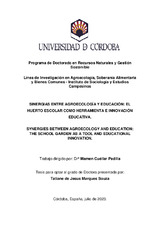Mostrar el registro sencillo del ítem
Sinergias entre agroecología y educación: el huerto escolar como herramienta e innovación educativa
| dc.contributor.advisor | Cuéllar Padilla, María del Carmen | |
| dc.contributor.author | Marques Souza, Tatiane de Jesús | |
| dc.date.accessioned | 2023-11-29T13:27:58Z | |
| dc.date.available | 2023-11-29T13:27:58Z | |
| dc.date.issued | 2023 | |
| dc.identifier.uri | http://hdl.handle.net/10396/26270 | |
| dc.description.abstract | Considerando las consecuencias debidas a las múltiples crisis contemporáneas, entre ellas la ambiental y la alimentaria, en esta tesis se discuten algunas contribuciones desde la agroecología y la educación. Para ello, analizamos las teorías del aprendizaje, los procesos educativos que apuntan hacia el cambio, subrayamos entre ellos las teorías críticas que integran la agroecología y presentan factores novedosos como la formación de la creatividad, la autonomía y la ética eco social, tan necesarias para la construcción de los principales objetivos de la agroecología: sustentabilidad, justicia social y equidad. En ese camino identificamos la escuela como un espacio de actuación y el huerto escolar como un punto de sinergias entre lo agroecológico y lo educativo. Nuestra investigación, de tipo cualitativa, tiene como objetivo principal analizar el huerto escolar como herramienta del proceso educativo agroecológico, visibilizando las potencialidades innovadoras que se pueden construir en la búsqueda del conocimiento hacia la sustentabilidad. Se siguen tres procesos metodológicos. Primero, investigamos las contribuciones que el huerto puede aportar a la comunidad escolar a nivel de innovaciones educativas. Para ello, hemos trabajado en una herramienta de análisis, a partir de revisión bibliográfica de los principales criterios con los cuales los/as investigadores/as vienen evaluando un proceso innovador. Segundo, hemos hecho uso de la observación participante como principal herramienta de la investigación participativa. Por último describimos tres estudios de caso en escuelas públicas de diferentes países: Brasil, Chile y España y su respectivo desarrollo metodológico. En los resultados obtenemos una herramienta de análisis que ha orientado la discusión de los estudios de caso, considerando los límites y potencialidades que presenta cada huerto en su entorno escolar. Nuestros aprendizajes, consideraciones y desafíos futuros apuntan a que los huertos, de forma general, tienen un alto potencial innovador como instrumento educativo, pero para ello hay que valorar su origen, su diseño, así como el proceso de desarrollo que le acompaña. | es_ES |
| dc.description.abstract | Considering the consequences due to multiple contemporary crises, among them environmental and food crises, this thesis discusses some contributions from agroecology and education. For this purpose, we analyze the learning theories, the educational processes that aim at change as well as we underline the critical theories that integrate agroecology and present novel factors such as the formation of creativity, autonomy and eco-social ethics, so necessary for the construction of the main objectives of agroecology: sustainability, social justice and equity. In this way we identify the school as a space for action and the school garden as a point of synergy between agroecology and education. Our research, from a qualitative perspective, has as its main objective the analysis of the school garden as a tool for the agroecological educational process, making visible the innovative potentialities that can be built in the search of knowledge towards sustainability. In this essay three methodological processes will be followed. Firstly, we will be investigating the contributions that the garden can bring to the school community as for educational innovations. In this way, we have been working on a tool for analysis, based on a bibliographic review of the main criteria used by researchers to evaluate an innovative process. Secondly, we have used participant observation as the main tool of participatory research. Finally, we will describe three cases of study in state schools in different countries: Brazil, Chile and Spain and their respective methodological development. In the results we obtained a too for analysis that has guided the discussion of the case studies, considering the limits and potentialities that each garden presents in its school background. Our learnings, considerations and future challenges point to the fact that the gardens, in general, have a high innovative potential as an educational tool, but for this it is necessary to assess their origin, their design, as well as the developmental process that follows them. | es_ES |
| dc.format.mimetype | application/pdf | es_ES |
| dc.language.iso | spa | es_ES |
| dc.publisher | Universidad de Córdoba, UCOPress | es_ES |
| dc.rights | https://creativecommons.org/licenses/by-nc-nd/4.0/ | es_ES |
| dc.subject | Crisis alimentaria | es_ES |
| dc.subject | Agroecología | es_ES |
| dc.subject | Educación | es_ES |
| dc.subject | Aprendizaje | es_ES |
| dc.subject | Innovación educativa | es_ES |
| dc.title | Sinergias entre agroecología y educación: el huerto escolar como herramienta e innovación educativa | es_ES |
| dc.title.alternative | Synergies between agroecology and education: the school garden as a tool and educational innovation | es_ES |
| dc.type | info:eu-repo/semantics/doctoralThesis | es_ES |
| dc.rights.accessRights | info:eu-repo/semantics/openAccess | es_ES |

